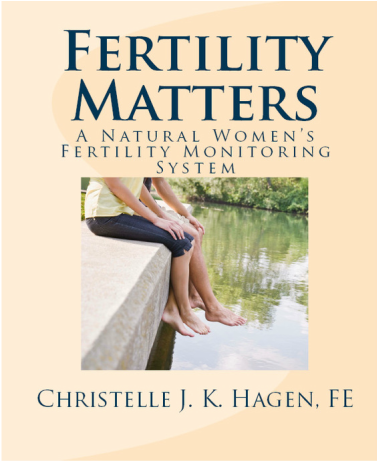We had been hoping for and planning to try for another child -- so the news I was pregnant was welcomed by both of us -- but I share this story to let you know that holiday weaning -- and an unexpected holiday-conceived baby -- aren't just theories for me! A mere two months prior to that positive pregnancy test, when our oldest child turned two years old, I had visited my doctor to let her know that my fertility (both menstruation and ovulation) had not yet returned. Due to my prior history of infertility, she had advised that we begin to investigate possible causes. However, I had done nothing more than talk to the doctor when we conceived our dearly loved second child. Surprise! What happened? After giving birth, a breastfeeding mother has two different hormonal "sides" that can be imagined as the two sides of a scale. On one side, she has breastfeeding hormones that promote lactation (and tend to suppress ovulation) -- and on the other, reproductive hormones that promote ovulation, and which may lead to another pregnancy. While the timing of her return of fertility varies from woman to woman, and even from baby to baby by the same mother (due to many different factors) the general principle is that frequent and unrestricted suckling at the breast is the most important factor that keeps the breastfeeding hormones side of the scale "heavier," resulting in continued natural suppression of fertility. However, the further out in time from the birth, the easier it is for the reproductive hormones to tip the scales, so that menstruation or ovulation may return. This is part of the reason why the holiday season is indirectly responsible for many late summer and fall babies! What factors contribute to this unexpected holiday-related return of fertility? Here is a partial list:
If, like my husband and me, you are hoping for another baby, then just pay attention to your signs of fertility and enjoy making your holiday baby if the signs point to being fertile! However, especially if your baby is under a year old, you may want to protect your breastfeeding relationship, discourage weaning, and delay making a new baby until later in the future. In that case, you definitely want to do what you can to avoid changes in your usual nursing and sleeping routines as much as possible. This may not be the year to host holidays and celebrations! Keep your meals and preparations simple, and maybe even skip some of this year's parties. Remember, you need to maintain your normal routines as much as possible, so that baby's frequent suckling at the breast remains as consistent as possible. At the same time, be vigilant to observe and record your signs of fertility, so that if you do detect any changes that indicate fertility, you and your husband can still celebrate, but in less intimate ways. If a more detailed discussion of how to protect your breastfeeding relationship during the holidays, how to interpret your signs of fertility, or how to understand the return of fertility after birth would be helpful to you, contact me (Christelle) to book a free online, phone, or in-person consultation. As a certified breastfeeding counselor and fertility educator, I can help! For Catholic breastfeeding mothers, "Navigating the Holidays as a Breastfeeding Family," and the unexpected return of fertility are the discussion topics of our online Catholic Nursing Mothers' Group in November. Reach out if you would like to join us for this free online breastfeeding support group!
0 Comments
If you've used Natural Family Planning [NFP] or a fertility awareness method for any length of time, you've probably heard this joke: Q. What do you call people who use NFP? A. Parents! [Yucka yucka yucka.] You may have heard that natural methods of family planning have a very high rate of effectiveness at avoiding pregnancy, as high as 99% effective, depending on the rules followed. To achieve this high rate of effectiveness, natural methods of family planning rely on abstinence from sexual intercourse and genital contact without penetration -- yes, contact pregnancies are a thing. So if that's the case, how come "NFP families" tend to be so darn big??!! (Cue family photo here.)  (Yes; they're all ours.) Let's get real. How come NFP families tend to be so darn big? 1. Taking chances. NFP requires abstinence. As I said before, "To achieve this high rate of effectiveness, natural methods of family planning rely on abstinence from sexual intercourse and genital contact." How many people do you know who are super good at abstinence from say, junk food? White lies? Gossip? And those aren't even particularly good things. Sex is a good thing. Sex with one's spouse is a very good and wonderful, and yes, pleasurable thing. Let's be real...sometimes the idea of maybe-possibly-who-knows? we could have another baby -- and babies are also very good and wonderful -- doesn't seem like such a Bad Idea. So the couple takes a chance...and along comes little Jenny or Timmy. I won't embarrass my kids by naming names, but let's just say I have personal experience with reason #1. If you are serious about not getting pregnant, you cannot, I repeat, CANNOT, take chances. 2. Being inexperienced or "relaxed". If you don't really understand how NFP works... like maybe you learned from the internet for example...you might not really understand how to observe, record, and interpret your signs of fertility. The evil twin sister of this idea is when you really do know how to do all of the above, but you just get kind of in a mindset that things are usually like "x" so you don't really need to do all the things and poof! just like that, something changes and a couple weeks later you're looking down at two pink lines...ask how I know lol. Natural methods are very unforgiving of missed observations and wishful thinking. You gotta do the method consistently to expect it to work. 3. Changing your minds. One of the benefits of natural methods of family planning is even if yesterday you were darn sure you never wanted another baby, you can change your mind the very next day and there's nothing to worry about or wait for. Go ahead and try! Newsflash: families using NFP don't need to announce their pregnancy intentions to anybody, so even if you assume or they told you that they're using NFP to avoid pregnancy, maybe they changed their minds and that is why they're having another baby! Don't assume the method "failed" -- it actually may have been used to achieve a wanted pregnancy! Thank the method for indicating you were fertile so you were able to have a baby that you wanted! 4. Method failure. While rare, it is possible that the couple used the natural method correctly, didn't take chances, and still got pregnant. If you are having sex, or even just "fooling around" without penetration, pregnancy is possible. This is true of any methods (natural or not), as long as the woman's ovaries and the man's testicles are intact. Even patients who have had a tubal ligation or vasectomy become pregnant from time to time. Life sometimes finds a way, even when the "chance" of pregnancy is extremely low! As with any family planning method, natural methods used correctly may fail to prevent pregnancy. If your sexual organs are intact, complete abstinence is the only way to be 100% certain you will not become pregnant. Share your NFP stories! I would love to hear from you!
The self-proclaimed egalitarian lifestyle blog, Ezer, recently published a post titled "On Demand Sex Won't Meet Your Husband's Needs," by freelance writer and kindergarten teacher, Bailey, concerning the expectation of "on demand sex" within Christian marriage. Here are my thoughts on this topic, as a natural fertility educator and happy wife of almost twenty years.
In a genuine, loving marriage, one's spouse must be more than a convenient means to one's own pleasure--a perverse state which is in fact, self-love. In contrast, married persons are called to "love, honor and cherish" their spouses--as so beautifully stated in the traditional marriage vows. Elsewhere, Paul encourages Christian husbands to "love their wives as they do their own bodies" and to "nourish and tenderly care" for their wives as they do their own bodies (Ephesians 5:28). The proposed 'selfish' interpretation of this passage from I Corinthians seems strangely at odds with the entire Christian faith, which is one of self-sacrifice, not indulgence. And certainly, a Christian marriage, where husband is called to symbolize Christ, and the wife, His Bride, (cf. Ephesians 5:22-23) must not be self-seeking, but one of mutual love, tenderness, and care. Indeed, Paul tells husbands to imitate Christ who "gave himself up" for His bride (Ephesians 5:25). It is completely incongruous to imagine the same Paul who calls Ephesian husbands to give themselves up, even to the point of death, would here be giving Corinthian husbands carte blanche to indulge themselves in sexual intercourse at whim without concern for the desires of their wives. But what of the end of this passage, where Paul seems to criticize, or at least strongly caution against, the abstinence from sexual intercourse upon which natural family planning methods are based? While I haven't conducted a survey, there is no doubt a wide range of frequency of intercourse between individual marriages. And certainly, depending on the stage of life one is in, within the same marriage over time there will be seasons of frequent intercourse--and seasons of infrequent intercourse. Nonetheless, a loving marriage normally includes the good of intercourse as often as the spouses decide, as a beautiful means of uniting them, and delighting each other, as well as helping to bring children into the world, when they are so blessed. I do not believe that this passage is so much a condemnation or discouragement of natural family planning, so much as an encouragement that spouses not hurt the other by stubbornly refusing sex. My interpretation is based on the inclusion in 1 Corinthians 7:5 of that one important concept: mutual agreement. Any mature marriage will necessarily go through some periods in which sex cannot be a daily (or hourly!) habit, depending on busy-ness, illness, care of small children, work trips or responsibilities, etc. So surely Paul is not saying here that it is inherently dangerous for the couple to refrain from sexual relations from time to time. The concept of "on demand sex" is at odds with the practice of natural family planning, because on demand sex falsely elevates one spouse above the other, who is treated as an object. In contrast, the marriage enriched by the practice of mutual self-restraint calls the spouses to view each other as partners who are at least symbolically co-laboring on the work of building their family, by cooperating with their natures--whether the goal is to conceive a new child, or to avoid pregnancy, or even to accept whatever will come, but with 'eyes open' due to the awareness of the possibility of pregnancy (the vast majority of the time). A word of encouragement: for those with spouses who are at the beginning of this journey of self-mastery--the practice of natural family planning, with its inherent encouragement to cooperate together with the natural rhythms of fertility and infertility (depending on your pregnancy intention) is quite beneficial in encouraging growth in self-control, if freely chosen by both parties. I repeat: it must be undertaken with mutual agreement (as Paul so wisely encourages). Properly understood, I believe that this passage from 1 Corinthians must not to be taken as a license for one spouse to demand sex from the other, but for both spouses to humble themselves to each other, as they grow together in learning to more perfectly express the language of physical intimacy.
The Fertility Matters Natural Women's Fertility Monitoring System Since healthy men are always fertile, becoming pregnant naturally - or naturally postponing pregnancy effectively - depends on understanding whether a woman is fertile or not at a particular time--by regularly observing and interpreting a woman's natural signs of fertility and infertility. Menstruating women of childbearing age move through a series of three "phases" as they move from their menstrual period, through ovulation, to the time following ovulation, up to the next menstrual period, typically about a month or so after their last menstrual period. The Fertility Matters Fertility Monitoring System provides couples with a day-to-day visual guide for determining whether she is in the first, relatively infertile, phase; the second--fertile--phase, or the third, quite infertile phase. Through a series of three classes, couples learn how to observe these natural bodily signs of fertility and infertility; how to record them correctly; and how to interpret what they have observed and recorded, so that, if they wish, they can time when they have marital relations in order to achieve pregnancy or postpone pregnancy. Fertility Matters classes also include a wealth of information on ways to naturally support or enhance fertility, for a woman's general health and well-being. One of the core, unique concepts of Fertility Matters classes is the inclusion of the Four Seasons of the Childbearing Year, and the importance of each "season" of a woman's childbearing years--not only fertility, but also pregnancy, childbirth, and breastfeeding--and how each season is beneficial for a woman's health and long-term well-being. Other special features of my course include my exclusive GIFTs goal-setting process for couples to use to help them better align their actions with their intentions; an optional Bible Study about fertility and sexuality; and private fertility counseling sessions with me, so that couples can feel confident as they learn how to observe, record, and interpret their signs of fertility and what they have charted. As a natural family planning method, "Fertility Matters" relies heavily on the work and research of Dr. John Billings of Australia, as well as the work of Dr. Konald Prem and John and Sheila Kippley, under whom I was originally trained as an instructor of Natural Family Planning. The Fertility Matters course includes the book, A Cooperative Method of Natural Birth Control by Margaret Nofziger. Not a true "method"--since I am not a medical researcher!--the rules used are based on those of Dr. Billings, and the Kippley-Prem system. Fertility Matters is simply a different, and I would argue, a more intuitive way, to chart a woman's observations of her natural signs of fertility and infertility--one that is easy to interpret correctly. Time for a little biology lesson, or review, if these concepts are familiar to you. The three phases of infertility-fertility/ovulation-infertility are referred to as a "fertility cycle." Usually quite soon after her menstrual period has ended, a woman's cervix (the opening to her womb) begins to secrete a fluid that has the purpose of transporting her husband's sperm through the cervix and into the womb, allowing the sperm to easily achieve their goal--locating the woman's egg typically in one of her fallopian tubes, where, if conception occurs, one lucky sperm is chosen to unite with the woman's egg and a unique, unrepeatable human life begins. A woman's cervix (and her cervical fluid) also nourishes and even shelters sperm so that if ovulation is somewhat delayed, sperm are released later in a kind of "time release" fashion. This is why conception can occur days after just one act of marital union. Throughout her fertility cycle, cervical fluid production follows a "wave"-like pattern. It typically begins to flow in limited fashion, then, as ovulation nears, more cervical fluid is produced, and it develops the quality of being highly stretchy. After ovulation, these changes are reversed--the fluid is no longer stretchy and is produced in decreasing quantities until it dries up completely. Her cervix's special "fertility promoting" fluid will not be produced again until her next fertility cycle, assuming she has not become pregnant. The last day on which her cervix produces this special fertility-promoting fluid is called the "peak" day of her fertility cycle--because fertility is all "down hill" from there. It should be clear from this description that for several days before ovulation, at ovulation, and even up to two days after ovulation, pregnancy is likely if the couple engages in marital relations. It is not possible to definitely determine the exact day of ovulation without ultrasound. Therefore, for couples seeking to avoid pregnancy, a key concept in interpreting whether a woman is fertile or infertile is correctly interpreting that enough days have passed the likely time of ovulation so that conception is no longer likely--in fact, is now highly unlikely. As an experienced fertility educator & counselor, I notice that students in my classes often struggle with the concept of "peak" day. Many students erroneously assume that "Peak Day" is the day on which a woman produces the most cervical fluid, and therefore, begin to count down to the infertile phase too early. However, as I described above, Peak Day is the last day of any type of cervical secretion that indicates high fertility. I designed the Fertility Matters charting system to make it more obvious that a woman has passed her Peak Day. Fertility Matters has the woman chart her observations so that highly fertile observations are placed--literally--at the "peak" of her chart, so that once her observations--again, literally--cross the top of the hill and begin to decline, the couple knows they can begin the countdown to the infertile phase. Otherwise, they begin the countdown too soon, and an unintended pregnancy is more likely. While I believe Fertility Matters is beneficial for couples seeking to postpone pregnancy, (given the way observations are charted) I believe it is MOST beneficial to couples seeking to achieve pregnancy. As I described above, the classes include vital information about natural ways to enhance fertility. Most natural family planning classes assume students are there with the intention to avoid pregnancy, an assumption that does not meet the educational needs of couples who want help to become pregnant. For this reason, I developed separate courses--including unique classes and different books--for couples with different pregnancy intentions and different fertility-interpretation challenges, and therefore, different educational needs. In addition to class goals and methods focused on the needs of couples who want to become pregnant, the Fertility Matters charting system itself benefits couples seeking to achieve pregnancy. It helps couples better understand when the woman is at her time of maximum fertility, so that they can time their efforts to achieve pregnancy more effectively. In addition to courses designed for couples seeking to avoid and achieve pregnancy, there are Fertility Matters courses for couples facing the unique challenges of interpreting their fertility in the postpartum time or while breastfeeding; and for couples nearing or passing through premenopause. At this time, live Fertility Matters classes are only available locally, in the Twin Cities / St. Croix Valley area. However, I intend to make them available in the future as online classes. In the meantime, I offer the classes privately, via online technology. If you are interested, feel free to contact me!
|
Details
Archives
November 2023
Categories
All
Enter Your Email Address to get St. Croix Birth Blog Posts in Your Inbox(We don't collect your email address and you won't get anything else from us.)
|




 RSS Feed
RSS Feed